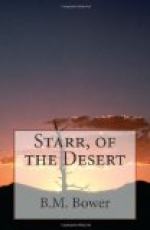Helen May fell again under the spell of the desert and the moon. Starr, walking steadily through the white-lighted barrenness with his shadow always moving like a ghost before him, fitted once more into the desert. Again she repeated mentally the words of the song:
Let the night-winds touch thy brow
With the breath of my burning sigh,
And melt thee to hear the vow
Of a love that shall not die!
Till the sun grows cold,
And the stars are old,
And the leaves of the Judgment Book unfold!
And now the lines sung themselves through her brain with the memory of Starr’s voice. But Starr did not sing again, though Helen May, curious to know if her thoughts held any power over him, gazed intently at his back and willed him to sing. He did not look back at her, even when she finally descended weakly to the more direct influence of humming the air softly—but not too softly for him to hear.
Starr paid no attention whatever. He seemed to be thinking deeply—but he did not seem to be thinking of Helen May, nor of desert love songs. Helen May continued to watch him, but she was piqued at his calm indifference. Why, she told herself petulantly, he paid more attention to those goats than he did to her—and one would think, after that song and that look.... But there she stopped, precipitately retreating from the thought of that look.
He was a queer fellow, she told herself with careful tolerance and a little condescension. A true product of the desert; as changeable and as sphynxlike and as impossible from any personal, human standpoint. Look how beautiful the desert could be, how terribly uplifting and calm and—and big. Yet to-morrow it might be either a burning waste of heat and sand and bare rock, or it might be a howling waste of wind and sand (if one of those sand storms came up). To herself she called him the Man of the Desert, and she added the word mysterious, and she also added two lines of the song because they fitted exactly her conception of him as she knew him. The lines were these:
From the desert I come to thee,
On my Arab shod with fire.
This, in spite of the fact that Rabbit had none of the fiery traits of an Arabian steed; nor could he by any stretch of the imagination be accused of being shod with fire, he who planted his hoofs so sedately! Shod with velvet would have come nearer describing him.
So Helen May, who was something of a dreamer when Life let her alone long enough, rode home through the moonlight and wove cloth-of-gold from the magic of the night, and with the fairy fabric she clothed Starr—who was, as we know, just an ordinary human being—so that he walked before her, not as a plain, ungrammatical, sometimes profane young man who was helping her home with her goats, but a mysterious, romantic figure evolved somehow out of the vastness in which she lived; who would presently recede again into the mysterious wild whence he had come.




